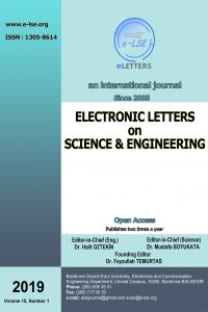Çevrimiçi Öğrenme Ortamında Akademik Başarıyı Artırmak İçin Karar Destek Sistemi
: Çevrimiçi Öğrenme, Veri Madenciliği
Activity Suggestion Decision Support System Design In Online Learning Environment
Online Learning, Educational Data Mining, Classification Methods Decision Tree Algorithms, C5 Decision Tree Algorithm,
___
- [1] Cao, J., & Xiong, L. Protein Sequence Classification with Improved Extreme Learning Machine Algorithms, BioMed Research International, (2014), 1-12.
- [2] Kör, H., Çataloğlu, E., & Erbay, H. Uzaktan ve Örgün Eğitimin Öğrenci Başarısı Üzerine Etkisinin Araştırılması. Gaziantep University Journal of Social Sciences, 12(3) (2013), 267-279.
- [3] Karaman, K., & Akgül, İ. İlkokul Öğrencileri İçin Web Tabanlı Değerler Eğitimi Uygulaması. Uşak Üniversitesi Sosyal Bilimler Dergisi, 8(3) (2015), 87-100.
- [4] Benoit, G. Data mining. Annual Review of Information Science and Technology, 36(1) (2002).
- [5] Oracle. Data Mining Concepts. URL https://docs.oracle.com/cd/B28359_01/datamine.111/b28129/process.htm#DMCON002 ,2018.
- [6] Guruler H., Istanbullu, & A., Karahasan, M. A. New student performance analysing system using knowledge discovery. Computers & Education, 55(1) (2010), 247-254.
- [7] Manyika J., Chui, M., Brown, B., Bughin, J., Dobbs, R., Roxburgh,C., & Byers, A. Big Data: The Next Frontier for Innovation, Competition, and Productivity, McKinsey Global Institute, 2011.
- [8] Castro F., Vellido, A., Nebot, A., & Mugica, F. Applying Data Mining Techniques to e-Learning Problems. Studies in Computational Intelligence, 62(1) (2007), 183-221.
- [9] Wanli, X., Rui, G., Eva, P., & Sean, G., Participation-based student final performance prediction model through interpretable Genetic Programming: Integrating learning analytics, educational data mining and theory, Computers in Human Behavior, 47 (2015), 168-181.
- [10] Peña-Ayala A. Educational data mining: A survey and a data mining-based analysis of recent works. Expert Systems with Applications, 41(4) (2014), 1432-1462.
- [11] Diaz, V. Cloud-Based Technologıes: Faculty Development, Support, And Implementatıon, Journal of Asynchronous Learning Networks, 15(1) (2011), 95-102.
- [12] Horzum M. B. Interaction, Structure, Social Presence, and Satisfaction in Online Learning, Eurasia Journal of Mathematics, Science & Technology Education, 11(3) (2015), 505-512.
- [13] Pala F. K., & Erdem, M. Öğretmen Adaylarının Çevrimiçi Tartışma Ortamlarına Yönelik Görüşleri, Turkish Online Journal of Qualitative Inquiry, 6(2) (2015), 24-47.
- [14] Cristóbal, C.S. e-Learning as an Object of Study, Universities and Knowledge Society Journal, 7(2) (2010), 1-11.
- [15] Moreno L., Gonzalez, C., Castilla, I., Gonzalez, E., & Sigut, J. Applying a constructivist and collaborative methodological approach in engineering education. Computers & Education, 49(3) (2007), 891-915.
- [16] Cheung Christy, M.K., Lee, Matthew, K.O., Lee, & Zach, W.Y. Understanding the continuance intention of knowledgesharing in online communities of practice through the post-knowledge-sharing evaluation processes. Journal of the American Society for Information Science & Technology, 64(7) (2013), 1357-1374.
- [17] Tseng F. C., & Kuo, F.Y. A. Study of social participation and knowledge sharing in the teachers’ online professional community of practice. Computers & Education. 72(1) (2014), 37-47.
- [18] Yao C.Y., Tsai, C.C. & Fang, Y.C. Understanding social capital, team learning, members’ e-loyalty and knowledge sharing in virtual communities. Total Quality Management & Business Excellence. 26(6) (2015), 619–631.
- [19] Ifenthaler, D. From Educational Data Mining To Automated Analysis Of Semantics, Applied Teaching and Learning Research. Retiered from http://documents.epfl.ch/groups /m/mo/mooc-admins/www/documents/Ifenthaler-LAW.pdf, 2014.
- [20] Siemens G., & Baker, R. S. Learning analytics and educational data mining: towards communication and collaboration, 2nd international conference on learning analytics and knowledge, Vancouver, British Columbia, Canada, 252-254, 2012.
- [21] Ghisoiue et al. Designing a DSS for Higher Education Management, Proceedings of CSEDU2009, Lisbon, Portugal, (2009), 335-340.
- [22] Bresfelean, V. P., & Ghisoio N.(2010), Higher Education Decision Making and Decision Support Systems, Wseas Transactions On Advances In Engineering Education, 2(7) (2010), 43-52.
- [23] Bienkowski M., Feng, M., & Means, B.(2012). Enhancing Teaching and Learning Through Educational Data Mining and Learning Analytics: An Issue Brief, U.S. Department of Education, Office of Educational Technology. Washington, D.C, 2012.
- [24] Baker R., S., & Inventado, P.S. Educational Data Mining and Learning Analytics, Learning Analytics: From Research to Practice. Ed: White J.A. Larusson and White. B. New York : Springer Science+Business Media, 2014.
- [25] Gunnarsson B. L., & Alterman, R. Predicting failure: A case study in coblogging, Computers in Human Behavior. 2nd international conference on learning analytics. Vancouver, 29 Nisan - 2 May, 2012, British Columbia, Canada, 263-266, 2012.
- [26] Siemens G., & Baker, R. S. Learning analytics and educational data mining: towards communication and collaboration, 2nd international conference on learning analytics and knowledge, 29 April-2 May, Vancouver, British Columbia, Canada, 252-254, 2012.
- [27] Harrell F. E. Regression Modeling Strategies: With Applications to Linear Models, Springer, 2001.
- [28] North M., Data Mining for the Masses. A Global Text Project Book, 2012.
- [29] Ali L., Asadi, M., Gašević,D., Jovanović, J., & Hatala, M. Factors Influencing Beliefs For Adoption of Alearning Analyticstool: An Empirical Study. Computers & Education, 62(1) (2013), 130-148.
- [30] Greller W., & Drachsler, H.Translating Learning into Numbers: A Generic Framework for Learning Analytics, Educational Technology & Society, 15(3) (2012), 42-57.
- [31] Sencer M., Toplum bilimlerinde yöntem, Beta Basım, İstanbul, 1989.
- [32] Gay L. R. , Educational research: Competencies for analysis and application (3rd ed.). Columbus: OH: Merrill, 1987.
- ISSN: 1305-8614
- Yayın Aralığı: Yılda 2 Sayı
- Başlangıç: 2005
- Yayıncı: Fevzullah TEMURTAŞ
Merve KOÇYİĞİT, Ayşegül GÜVEN, Furkan ÇAM
Mustafa KARHAN, Musa Faruk ÇAKIR, Çağatay ERSİN
Çevrimiçi Öğrenme Ortamında Akademik Başarıyı Artırmak İçin Karar Destek Sistemi
Hakan KÖR, Hasan ERBAY, Melih ENGİN
Elektroensefalografi Sinyallerinden Zihinsel Aritmetik Tabanlı Görev Ayırımı Sınıflandırması
Merve KOÇYİĞİT, Ayşegül GÜVEN, Furkan ÇAM
Savunma Sanayi İçin Örnek Bir IoT Uygulaması
